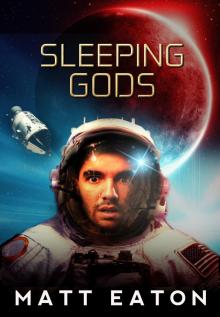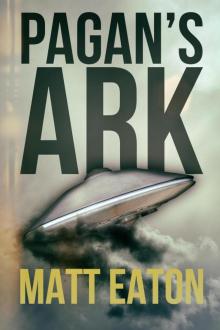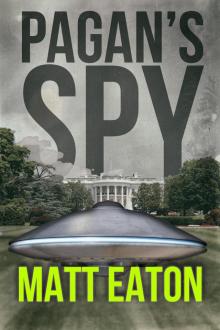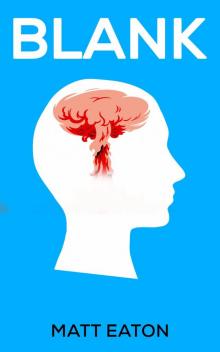- Home
- Matt Eaton
Pagan's Ark Page 2
Pagan's Ark Read online
Page 2
“And in that I will back Mr Churchill with my dying breath,” said Hinsley.
“There is one more thing I can tell you, provided you promise to keep it to yourself.”
“Think of this as the confessional, my boy.”
Donovan stifled a smile. He was 57 years old. For his hard-fought efforts as a battalion commander in the Great War he was awarded the Medal of Honor. He was personal intelligence advisor to the President. No one had called him ‘my boy’ in a long time. “One of the reasons President Roosevelt is so keen to support Britain is that you’re winning the air war. Ironically, that is a result of the London Blitz. Since the Luftwaffe stopped aiming at British fighter bases and started bombing the capital, allied planes have been shooting down their German counterparts at a rate of two to one. For this reason alone, England will not be invaded.”
The Cardinal nodded slowly. Donovan could see he was suitably impressed.
“Thank you for that.” Hinsley stared into space for a moment, like he was making up his mind about something. “Forgive me. I have neither time nor inclination to deal with fools.”
CHAPTER 2
November 16, 1940
Cardinal Hinsley sat taller in his chair and took a deep breath, like he was preparing to deliver a sermon.
“What I am about to tell you is a matter of the utmost importance,” he said. “It now befalls me to insist that what I reveal to you remains our secret, until you can speak to Mr Roosevelt face-to-face.”
The moment of truth. “You have my word, Cardinal.”
“Are you a man of faith, Colonel Donovan?”
“Most definitely. Irish Catholic. Before I went to Columbia Law School, I studied at Niagara University which, if you didn’t know, is a Catholic institution. I thought I might become a priest at one point.”
“What stopped you?”
“I wasn’t sure I was a good enough man for the job. I wasn’t sure I had the strength to honor a vow of celibacy.”
Hinsley smiled. “A struggle for many of us, it’s true.” He stood up and began walking slowly, beckoning Donovan to follow as he headed for a small wire-doored lift in a small antechamber attached to the library. He pulled open the cage, where there was just enough room for them both to stand. Hinsley closed the door sharply and turned a dial to begin the lift’s descent. It lurched so suddenly Donovan almost fell to his knees, except there was literally no room for him to fall down. He apologized as he fell against the Cardinal’s shoulder. Hinsley threw out a hand to prop him up and showed himself to be surprisingly strong.
“Has it ever occurred to you, Colonel Donovan, that our notions of the Creator as laid down by the tenets of our faith might be somewhat wide of the mark?”
It was the last question he expected from a man who could one day be Pope.
“No,” said Donovan, “I can’t say that it has.”
The lift came to a halt. Hinsley pulled open the wire door to reveal a dimly lit antechamber. Donovan could just make out two doors that faced one another on opposite walls of the chamber. The Cardinal stepped toward the door on the left, pulling a large key from his pocket. He opened the door to reveal nothing but darkness. He stepped into the darkness. “It’s fair to say what you’re about to see in this room has brought me to a crisis of faith,” he said.
Donovan, not a man easily scared, at this moment found himself experiencing a certain reluctance to follow. Somewhere in the gloom, Hinsley flicked a switch and a small lamp at the back of the room designed to look like a burning torch transformed the pitch black into a feeble twilight. They were standing in a small, marble-lined chapel. Atop the small altar table, a blanket covered what appeared to be a coffin. Hinsley stepped toward it and gently removed the blanket to reveal an ornate Egyptian sarcophagus. On its lid, a giant winged helmet gleamed in fine gold leaf. Down its sides, lines of hieroglyphics seemed to offer a detailed account of the occupant. Beside these was writing of a different sort that Donovan had never seen before. It was remarkably well preserved for something that had to be thousands of years old.
“It’s huge,” said Donovan. Though he is no scholar of antiquities, he was quite certain Egyptian coffins were not usually this big.
Hinsley said, “That’s because it was built for someone who is more than 11 feet tall.”
His words hung in the air as Donovan wondered whether he had heard right. “How could that be possible?”
Hinsley smiled, appreciating his guest’s incredulity. “He’s a Goliath.”
“A what?”
“You might be aware the tallest man in recent recorded history was Robert Wadlow – an American like yourself. He was 8 feet and 11 inches tall.”
Donovan nodded. He knew of the man. “He died just a few months back.”
“Yes, that’s right. He died a young man — his body was dysfunctional. Human beings aren’t supposed to grow that large.” Hinsley placed his hand on the sarcophagus. “But the fellow in here towers over Robert Wadlow. What’s more, I arranged for X-ray photographs of the body inside. And from what we can tell, he is in almost perfect physical condition.”
“I’m sorry?”
“The person inside this box... is alive and healthy.”
“No. That’s insane. It can’t be right.”
“My exact response. But the doctor I brought here to carry out the tests insists it is the case.”
“Have you opened the box to see for yourself?”
“The box is firmly fastened. It may require some sort of heavy machinery to cut it open. I don’t have that capability.”
“Is this doctor available to speak to me?”
“I have his full report upstairs. He is a devout man and has agreed to keep this matter to himself for now. It was his idea to contact President Roosevelt.”
Donovan stared at the sarcophagus and realized he was waiting for something to happen that would reveal its secrets. “Have you translated what’s written along the sides?”
“Only partially. I’ve been trying to persuade Father Paulson to work on it. He’s reluctant. But by our best estimates, this sarcophagus is at least three thousand years old. As old as the man inside it. And it would seem that by some strange science this box preserves life. For a very long time. Hundreds of years. Thousands.”
“Some strange science... Cardinal, what is it you want from us?” Donovan stares into the old man’s eyes, seeing conviction where he might have expected madness. “If I call Father Paulson down here, will he back you up? Or will he tell me his boss has lost his marbles?”
Hinsley laughed. “If I’m mad, you’ll know it soon enough, Colonel. But I doubt you’ll get Father Paulson inside this chapel.”
Donovan said nothing, allowing the silence to weigh heavily in the hope that Hinsley’s insanity might finally betray him. The old man held his gaze with such determination that eventually Donovan was the first to look away.
“Believe me, Colonel, I have questioned my own sanity many times these past weeks. I have sought answer in prayer and I have sought the counsel of men whose judgment I value as highly as my own. But what I am telling you is the God’s honest truth.”
Finally, Donovan said, “You still haven’t told me what you require of the US Government.”
“This box,” said Hinsley, his hand running reverently along the painted sarcophagus, “has the power to preserve life. It may even have the power to heal. Can’t you see why such a thing might be best kept out of Nazi hands?”
Donovan had to admit Hinsley’s reasoning was sound. “For argument’s sake, let’s say I take you at your word — can you explain to me how it came to be in your possession?”
“I am an old friend of Sir William Flinders Petrie, the Egyptologist. We share a love of the Old Testament. He found it in the Sinai in 1904. He’d kept it among his private collection of artefacts. But he had no idea of its power or the state of its occupant until a year ago, when — and this is where it gets strange — the man inside the box started talking
to him.”
Donovan’s eyes widened. None of this made any sense. He felt like he was sinking further and further down a well of insanity. “You believed him when he told you this?”
“I didn’t. But Father Paulson did. He heard the voice speaking to him. It’s why he refuses to set foot in this room. It upsets him.”
Donovan almost laughed. “Upsets him? I’m surprised he’s still in the building. I take it you don’t hear the voice?”
The Cardinal shook his head. “All quiet, I’m afraid.”
“Has there been any testing on the box itself?”
“Not yet,” Hinsley admitted. “But I can show you the medical report on the X-rays.”
Donovan wondered if the most likely explanation was that the sarcophagus itself was painted with some form of toxin that induced hallucination. But that didn’t explain the X-rays. Unless that too was entirely imagined.
He took a step back. “Who else knows about this?”
“Nobody. No museum has set eyes upon this coffin.”
“Why not? Wasn’t that Petrie’s job, to procure artefacts for museums?”
“This particular artefact is his dirty little secret. He found it while searching a mountain on the Plain of Paran known as Serabit el Khadim. On top of this mountain he found the ruin of an old temple dating back to 2600BC. Have you heard of Mount Serabit?
“The name’s familiar.”
“It is believed by some to be Mount Sinai, the place where Moses spoke to God after leading the Israelites out of Egypt.”
“Where Moses was given the Ten Commandments.”
Hinsley nodded. “As you might imagine, Petrie’s discovery of a tomb of Egyptian origin at this location would have been viewed with some displeasure in 1904. Such a find contradicts the biblical portrayal of the Exodus. It would have contravened the regulations of the Egypt Exploration Fund, the body that financed all of his work. It was founded for the purpose of further illustrating the writings of the Old Testament. Petrie was entirely reliant upon the fund. Without it, his work would have ground to a halt, so he kept the discovery of the sarcophagus to himself.”
“None of his workers have leaked the story in all that time?”
“Most did as they were told and kept quiet. I don’t think any of them ever understood its significance.”
“Why bring it to the attention of the church after so many years?”
“He believed he had witnessed a miracle and could no longer keep it to himself. He came to me because we are friends and because he had a giant living in his house and didn’t know what to do about it. When I told him I’d take care of everything, I thought I was merely offering comfort to an old man losing his way. Now I’m starting to wonder if it’s me who’s losing the way.”
“What is Rome’s position on this?”
Hinsley stared at Donovan for the longest time before finally letting loose a long sigh. “The Vatican knows nothing about it.”
“Why would you put yourself in that position?”
“Because I’m damned if I do and damned if I don’t,” the Cardinal said. “Fear is a terrible thing, especially in times of war. The same reason I don’t want to be answering to the British Government — they have enough on their hands already. We need to get this sarcophagus out of London, but I believe Mr Churchill would be loath to part with it if he knew.”
Donovan had to admit that was a distinct possibility. If there was any chance of weaponizing the power of this box, the British would want to know.
“There are also men of faith who would see the being in this coffin as a devil, some sort of vampire demon. Because whatever this creature is, it’s not human. At least, in the way we understand the human form. I’m not sure how one is supposed to explain that to the Pope in any sort of believable or acceptable manner. “
Hinsley sighed. He began to look weary. “Look Colonel Donovan, I will be perfectly frank with you. My greatest concern is that if I go to the Holy Father with this problem, it would not be long before the news found its way to the Germans. I know for a fact the man in charge of Vatican financial affairs, Bernardino Nogara, is in league with the Nazis. He is untroubled by scruple in his moneymaking endeavors, and the Pope distances himself from the man’s operations while allowing him to operate unimpeded.”
“Nogara. I feel like I should I know the name...”
“He heads up the Special Administration of the Holy See,” said Hinsley. “The only man in the Vatican with unfettered access to the Pontiff. Nogara has made tens of millions for the Church. And I know for a fact he’s invested church money heavily in the Italian and German military machines.”
“That’s a very serious allegation, Cardinal.”
Hinsley nodded solemnly. “It is. And one I don’t make lightly.”
Donovan was a man of deep Christian conviction, devout in his loyalty to the Catholic Church. But he was also enough of a realist to know that the souls of all men contained the seeds of corruption. “What do you require from us, Cardinal?”
“It’s not safe to keep the sarcophagus in London any longer. But at the same time, I’m afraid now that if I try to move it the news will get out. There are too many eyes upon us here. Someone inside these walls will talk. If Nogara learns of it and he tells the Fascists, who knows — it could be the catalyst to trigger Hitler’s invasion.”
“You want me to take your little problem off your hands. Back to America with me?”
“Nowhere in England is safe. But it needs to be removed in secret. If Mr Churchill learns of its existence, he will likely try to thwart your attempt.”
“I’d say that’s more of a certainty. To say nothing of the diplomatic incident that would ensue.”
“I know this is no small thing to ask Colonel Donovan, but can you do it?”
“It won’t be easy. And I’m not sure I could do it alone,” he replied.
“The Lord is our protector, Colonel.
“Tell that to the Bishop of Coventry.”
Hinsley smiled. “Ah, but he’s Church of England, you see. But I take your point. I will send Father Paulson with you. Incognito. Undercover.”
This strange conversation seemed unreal. He suspected there would be many more like it in the months and years to come. He scratched his head, more than a little unsettled. “Is Father Paulson the only option? Is there no one else?”
“He is a man of character. Trustworthy. I’d stake my faith on it.”
“That’s effectively what you’re doing,” said Donovan. “I’d need to be certain he has my back covered if we’re up against a wall.”
“Father Paulson is smart enough to keep you safely hidden behind the wall, Colonel.”
CHAPTER 3
April 10, 1951
In his 68 summers on Earth, ‘Wild’ Bill Donovan had seen all the extremes of the human condition — the highs, the lows, the horrors and the splendid wonders. As a man of the law, he had become a confidant of the rich and powerful. For his fearless leadership of America’s Office of Strategic Services during the war he was granted the rank of Brigadier General. As the OSS spymaster, he had seen unimaginable inhumanity and atrocity.
He liked to think of himself as an honorable man. He was also a believer, a true Catholic. A Papal knight, no less — Pope Pius XII had seen fit to honor Donovan’s war service by awarding him the Grand Cross of the Order of St Sylvester in 1944.
He often wondered what Cardinal Arthur Hinsley would have said to him if he had been around to witness the occasion. While he knew Hinsley would be proud, it occurred to him the Archbishop of Westminster might also want to know what Donovan had done during the war years to warrant the high regard of the Holy Father.
But Hinsley had died in 1943, before Donovan ever had another chance to speak to him. Their one and only meeting had been in London in 1940. Had Hinsley known then what the church would do — how it would respond to news the sarcophagus had been transported to New York?
Hinsley had made it clear all th
ose years ago that he was no fan of Pope Pius XII nor the man who served him, Bernadino Nogara. But in Donovan’s eyes, these two were a dynamic duo. It was true that Nogara had done many things in the name of the church that blurred the lines between good and evil. But Donovan still firmly believed the church was always trying to act in the greater good, even if this meant occasionally choosing the greater of two evils.
This was Donovan’s first time back in Rome since he had been awarded the Order of Sylvester. As usual, in making this journey he served many masters at once. As a member of the Verus Foundation, he was here to find out once and for all what had happened to that sarcophagus. But as far as the church was concerned, he had come bearing gifts of gold.
Bernadino Nogara’s offices, situated directly adjacent to the Pope’s private apartments, were somewhat sparse, more businesslike than religious. But then Nogara was more of a banker than a man of God. It could be up for discussion as to whether Nogara even qualified as a practicing Catholic. He headed up the Institute for Religious Works, the burgeoning financial institution better known to the outside world as the Vatican Bank. From all that Donovan had learned in recent years, he knew Nogara was most certainly no man of the cloth — he did things in the name of the church that would make an altar boy faint from shock. The Pope merely let him conduct affairs as Nogara saw fit. He was a money man, one who was handed the keys to the kingdom by the previous pope, Pius XI, to invest wisely the riches handed to the Vatican by Mussolini with the signing of the Lateran Treaty in 1929. Accordingly, Nogara had taken the 750 million lire (about 80 million US dollars) and turned it into even greater amounts. Little wonder he was retained in his post when Pius XII took office a decade later.
Donovan saw nothing wrong in turning a profit for the Holy See. It was the reason for his current visit. By his arrangement, the US Treasury secretary had approved the sale of almost $27 million in gold ingots to the Vatican at a price that was very much in the church’s favor. The US was keen to do all it could to keep Italy from becoming a communist country and this deal was seen to be a good step in that direction.

 Sleeping Gods
Sleeping Gods Pagan's Ark
Pagan's Ark Pagan's Spy
Pagan's Spy Blank Extra Chapter
Blank Extra Chapter